Developing Resilience in the Workforce: A Health Visiting Framework Guide for Employers, Managers and Team Leaders
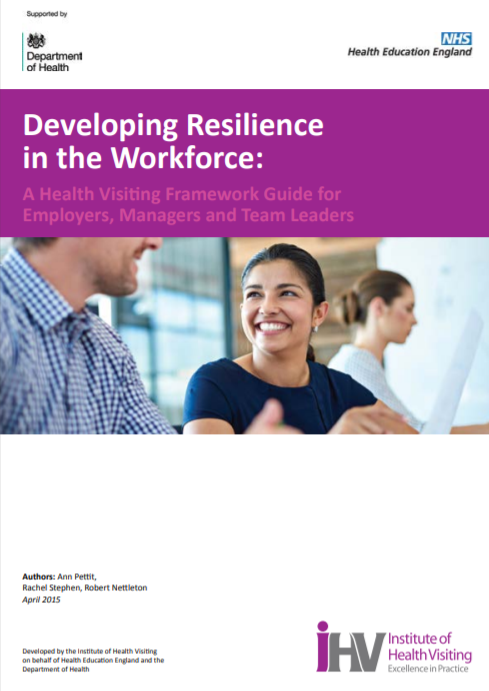
www.ewin.nhs.uk

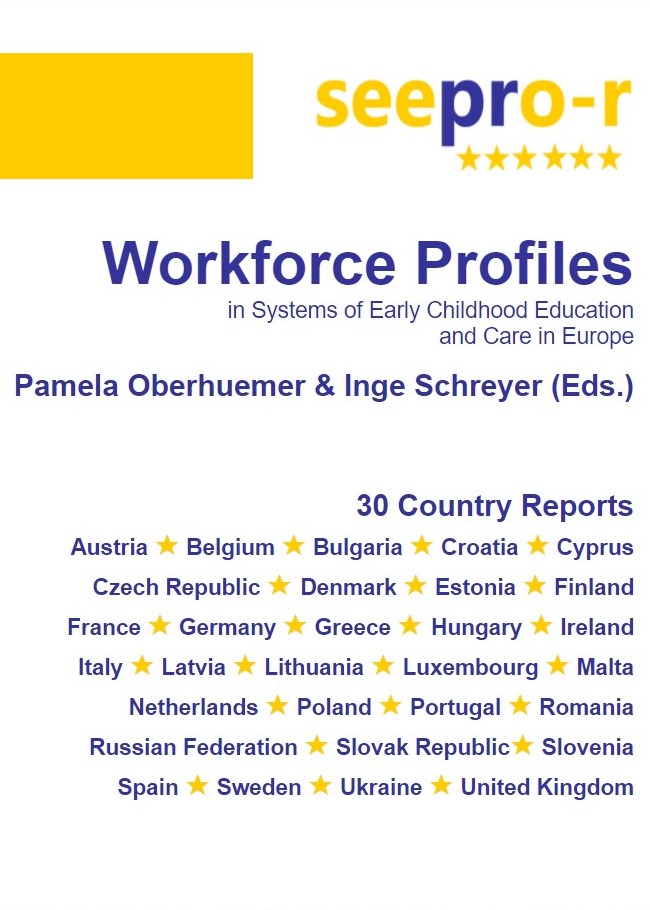
Below you may download one of the 30 Workforce Profiles (country reports) on the current status quo regarding the qualification requirements for early childhood education and care professionals (pedagogues, teachers, educators), the composition of the workforce, the systems of initial professional education and continuing professional development, current reform initiatives and research projects and selected aspects of the working conditions of staff in each of the 30 participating countries.The initial Workforce Profiles in Systems of Early Childhood Education and Care in Europe were provided by mostly long-standing cooperation partners according to a research specification which they received for comment before compilation of the data. The final versions are based on a long period of close collaboration between the editors and the authors. The reports vary in length between approximately 25 pages and 80 pages.SEEPRO-R takes a look at many of the new fundamental reforms including, qualification and competence requirements for early childhood workforce and the structures of professional studies and continuing education. More on the SEEPRO-R project here.
 UNITED_KINGDOM_ECEC Workforce.pdf
UNITED_KINGDOM_ECEC Workforce.pdf UKRAINE_ECEC_Workforce.pdf
UKRAINE_ECEC_Workforce.pdf SWEDEN_ECEC_Workforce.pdf
SWEDEN_ECEC_Workforce.pdf SPAIN_ECEC Workforce.pdf
SPAIN_ECEC Workforce.pdf SLOVENIA_ECEC_Workforce.pdf
SLOVENIA_ECEC_Workforce.pdf SLOVAK_REPUBLIC_ECEC Workforce.pdf
SLOVAK_REPUBLIC_ECEC Workforce.pdf RUSSIA_ECEC_Workforce..pdf
RUSSIA_ECEC_Workforce..pdf ROMANIA_ECEC_Workforce.pdf
ROMANIA_ECEC_Workforce.pdf PORTUGAL_ECEC_Workforce.pdf
PORTUGAL_ECEC_Workforce.pdf POLAND_ECEC_Workforce.pdf
POLAND_ECEC_Workforce.pdf THE_NETHERLANDS_ECEC_Workforce.pdf
THE_NETHERLANDS_ECEC_Workforce.pdf MALTA_ECEC Workforce.pdf
MALTA_ECEC Workforce.pdf LUXEMBOURG_Workforce.pdf
LUXEMBOURG_Workforce.pdf LITHUANIA_ECEC Workforce.pdf
LITHUANIA_ECEC Workforce.pdf LATVIA_ECEC Workforce.pdf
LATVIA_ECEC Workforce.pdf ITALY_ECEC_Workforce.pdf
ITALY_ECEC_Workforce.pdf IRELAND_ECEC_Workforce.pdf
IRELAND_ECEC_Workforce.pdf HUNGARY_ECEC_Workforce.pdf
HUNGARY_ECEC_Workforce.pdf GREECE_ECEC _Workforce.pdf
GREECE_ECEC _Workforce.pdf GERMANY_ECEC_Workforce.pdf
GERMANY_ECEC_Workforce.pdf
Transforming European ECEC services and Primary schools into professional learning communities: drivers, barriers and ways forward focuses on Professional Learning Communities, within competent early years systems, which help professionals better serve the complex needs of families and their children.The diverse societies in which we live make it impossible to find standardized solutions for all families. New competences like negotiation and reflection must be integrated with additional forms of continued professional development (CPD) that focus on the active and democratic participation of staff.Professional Learning Communities (PLCs) are a valuable answer to this complex issue. PLCs are ‘groups of people sharing and critically interrogating their practice in an on-going, reflective, collaborative, inclusive, learning-oriented, growth-promoting way’.Competent systems are essential for the creation and maintenance of PLCs. The latter require a multilevel network of competences, structural conditions, engagement, and awareness. This report seeks to:
The report includes specific conclusions and recommendations for policy makers in Member States. Please note that the report focuses on services and schools for 0 to 12 years old children. However, the key concepts and conclusions could also be re-adapted for secondary school.
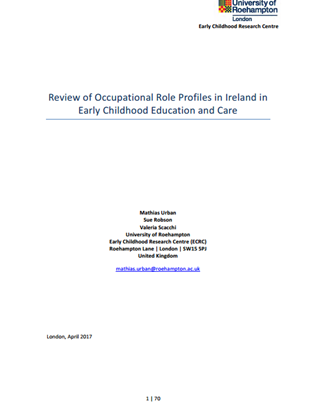
Review of Occupational Role Profiles in Ireland in Early Childhood Education and Care presents a profile for the early childhood profession in Ireland.
The aim is to develop the Irish early childhood care and education sector into a genuine Competent System. A central requirement for achieving this goal is a shared orientation for all practitioners working with children from birth to eight years, regardless of occupational status, job title and level of formal qualification.
The concept of Competent Systems in early childhood has been developed by the CoRe project – an international study that investigated Competence Requirements in Early Childhood Education and Care on behalf of the European Commission (Urban, Vandenbroeck, Van Laere, Lazzari, & Peeters, 2011). Central to a competent system is that shared orientations are not only required of practitioners ‘on the ground’ but of all professionals and institutions that together constitute the early childhood system: early childhood settings, training and professional preparation, research, regulation and governance, inspection and evaluation.
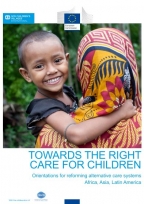
Towards the Right Care for Children: Orientations for reforming alternative care systems - Africa, Asia, Latin America, commissioned by the European Commission Directorate General for International Cooperation and Development commissioned SOS Children’s Villages International to conduct a study on the possible issue of institutionalization in six South and Central American, Asian and African countries, in order to strengthen the knowledge of the European Commission on the nature, the extent and scope of institutionalization and feasibility of the de-institutionalization.
The objectives of this research was to:
This synthesis report brings together desk reviews and country studies through which a large collection of documents from various sources have been consulted.
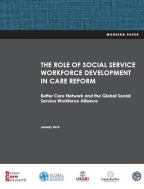
The Role of Social Service Workforce Development in Care Reform illustrates key issues by drawing on the experiences of Indonesia, Moldova and Rwanda – three countries are in the process of reform. Each country's reform takes place within their own context and history, social and political system, protection structure and services, and social services education system.
The case studies highlight each country’s reform processes and identifys learning in terms of the approach taken to strengthen and align the social service workforce given the needs of the system, the scope and actors involved, and the different care reform strategies and outcomes. The case studies are presented with recognition of the ongoing and dynamic process and are examples from different stages and contexts of reform.
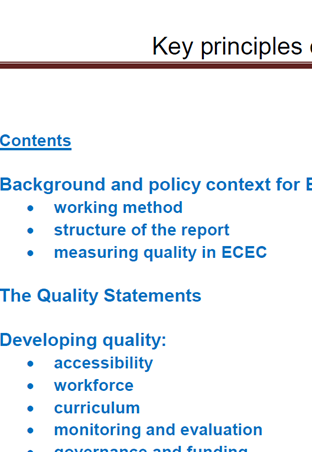
Proposal for key principles of a Quality Framework for Early Childhood Education and Care is the report of the Working Group on Early Childhood Education and Care under the auspices of the European Commission.
The authors of the report focus on which measures have helped Member States address and promote measurable improvements for children, families, local communities and society.
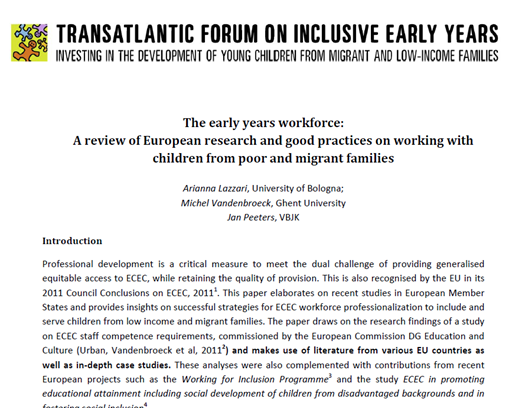
The early years workforce: A review of European research and good practices on working with children from poor and migrant families elaborates on recent studies in European Member States and provides insights on successful strategies for ECEC workforce professionalization to include and serve children from low income and migrant families. Four questions are central to this research:
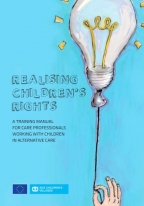
SOS Children’s Villages has been working to embed children’s rights within care settings for many years. Our approach has been multifaceted, embracing structures and institutions, care professionals and young people themselves. One gap identified in the course of this work has been the absence of effective training programmes for care professionals which have children’s rights at the core. This manual has been produced to fill that gap. The two-day course outlined in these pages is designed to familiarise groups of care professionals with the international standards and principles surrounding children’s rights – and above all, to relate this to the daily experience and challenges arising in the field of alternative care. The course is intended to provide participants with the information, motivation and strategies that they can use to carry children’s rights into their daily work. The aim is to contribute to higher quality care and a culture of respect for children’s rights.
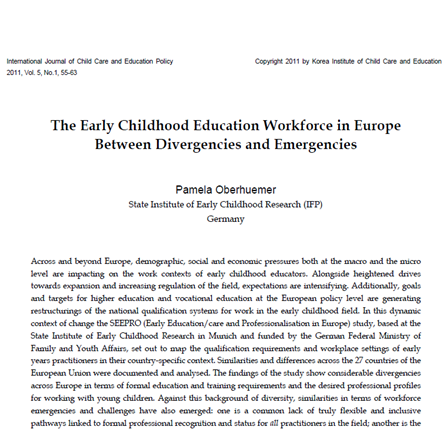
Across and beyond Europe, demographic, social and economic pressures both at the macro and the micro level are impacting on the work contexts of early childhood educators. Alongside heightened drives towards expansion and increasing regulation of the field, expectations are intensifying. Additionally, goals and targets for higher education and vocational education at the European policy level are generating restructurings of the national qualification systems for work in the early childhood field. In this dynamic context of change the SEEPRO (Early Education/care and Professionalisation in Europe) study, based at the State Institute of Early Childhood Research in Munich and funded by the German Federal Ministry of Family and Youth Affairs, set out to map the qualification requirements and workplace settings of early years practitioners in their country-specific context. Similarities and differences across the 27 countries of the European Union were documented and analysed. The findings of the study show considerable divergencies across Europe in terms of formal education and training requirements and the desired professional profiles for working with young children. Against this background of diversity, similarities in terms of workforce emergencies and challenges have also emerged: one is a common lack of truly flexible and inclusive pathways linked to formal professional recognition and status for all practitioners in the field; another is the continuing need to seek more effective ways of including men in the early childhood workforce.